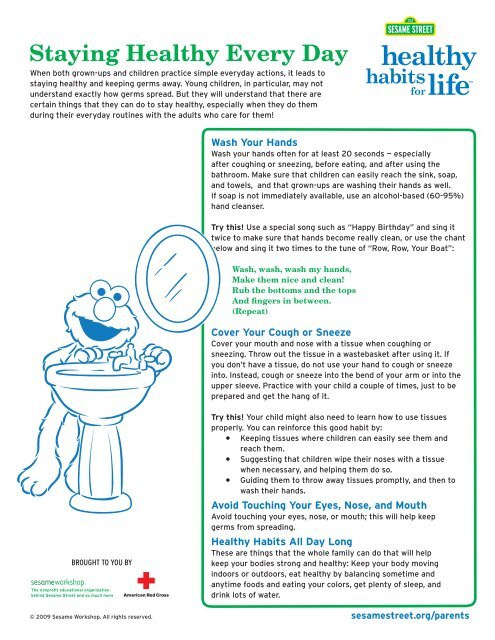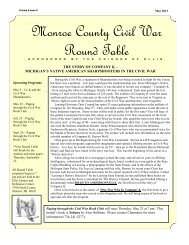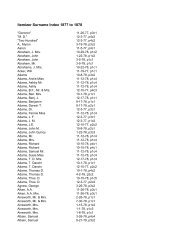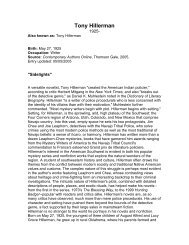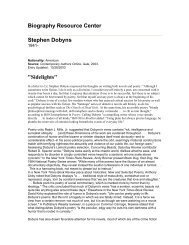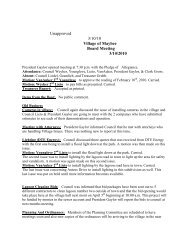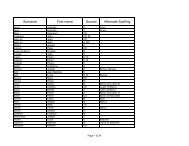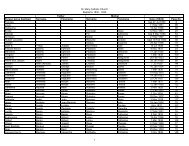You also want an ePaper? Increase the reach of your titles
YUMPU automatically turns print PDFs into web optimized ePapers that Google loves.
<strong>Staying</strong> <strong>Healthy</strong> <strong>Every</strong> <strong>Day</strong><br />
When both grown-ups and children practice simple everyday actions, it leads to<br />
staying healthy and keeping germs away. Young children, in particular, may not<br />
understand exactly how germs spread. But they will understand that there are<br />
certain things that they can do to stay healthy, especially when they do them<br />
during their everyday routines with the adults who care for them!<br />
BROUGHT TO YOU BY<br />
Wash Your Hands<br />
Wash your hands often for at least 20 seconds — especially<br />
after coughing or sneezing, before eating, and after using the<br />
bathroom. Make sure that children can easily reach the sink, soap,<br />
and towels, and that grown-ups are washing their hands as well.<br />
If soap is not immediately available, use an alcohol-based (60-95%)<br />
hand cleanser.<br />
Try this! Use a special song such as “Happy Birthday” and sing it<br />
twice to make sure that hands become really clean, or use the chant<br />
below and sing it two times to the tune of “Row, Row, Your Boat”:<br />
Wash, wash, wash my hands,<br />
Make them nice and clean!<br />
Rub the bottoms and the tops<br />
And fingers in between.<br />
(Repeat)<br />
Cover Your Cough or Sneeze<br />
Cover your mouth and nose with a tissue when coughing or<br />
sneezing. Throw out the tissue in a wastebasket after using it. If<br />
you don’t have a tissue, do not use your hand to cough or sneeze<br />
into. Instead, cough or sneeze into the bend of your arm or into the<br />
upper sleeve. Practice with your child a couple of times, just to be<br />
prepared and get the hang of it.<br />
Try this! Your child might also need to learn how to use tissues<br />
properly. You can reinforce this good habit by:<br />
• Keeping tissues where children can easily see them and<br />
reach them.<br />
• Suggesting that children wipe their noses with a tissue<br />
when necessary, and helping them do so.<br />
• Guiding them to throw away tissues promptly, and then to<br />
wash their hands.<br />
Avoid Touching Your Eyes, Nose, and Mouth<br />
Avoid touching your eyes, nose, or mouth; this will help keep<br />
germs from spreading.<br />
<strong>Healthy</strong> Habits All <strong>Day</strong> Long<br />
These are things that the whole family can do that will help<br />
keep your bodies strong and healthy: Keep your body moving<br />
indoors or outdoors, eat healthy by balancing sometime and<br />
anytime foods and eating your colors, get plenty of sleep, and<br />
drink lots of water.<br />
© 2009 Sesame Workshop. All rights reserved. sesamestreet.org/parents
Under the Weather<br />
Children and adults sometimes get sick. How can you make the situation easier for<br />
everyone? The important information and tips below are a great place to start!<br />
Stay Home When You Are Sick<br />
Encourage children to tell a grown-up when they feel sick. If you or your<br />
young child is sick, stay home so that you do not spread germs that can<br />
make others sick.<br />
If You Need to See a Doctor<br />
If your child isn’t feeling well, reaching out to your doctor can get you<br />
the expert advice you need to help him or her feel better.<br />
1. When you call the doctor:<br />
• Be ready to explain specific symptoms or concerns.<br />
• Inform the doctor or nurse of your child’s medical history.<br />
• Stay calm.<br />
2. If the doctor wants to see your child, be prepared:<br />
• Before you go, make note of information you want to share<br />
with the doctor and/or nurse, along with questions you’d like<br />
to ask.<br />
• Explain to your child where you’re going and why.<br />
• Bring a comfort item, such as a favorite toy or plush, that will<br />
help distract your child or which he or she can hold.<br />
• Keep asking questions to the doctor and/or nurse until you<br />
fully understand their explanations and instructions.<br />
• If the doctor prescribes medicine, make sure you understand<br />
exactly how to give it to your child.<br />
• Know what should bring you back to the doctor’s<br />
office if symptoms worsen or for follow-up.<br />
3. When you get home:<br />
• Talk to your child about the medicine and what she needs to<br />
do to feel better.<br />
• Keep the home environment as calm as possible.<br />
• Share the information with your child-care provider or other<br />
adults caring for your child.<br />
• Give big doses of tender loving care.<br />
Keep Talking<br />
There are a lot of warnings out there. Young children<br />
especially may have concerns, but may not necessarily<br />
express their fear or anxiety. Limit their exposure to media<br />
that may be speaking about illness, or other concerns,<br />
in ways that are not age appropriate. Do encourage<br />
family discussion to answer questions children<br />
may have — while also assuring them that the<br />
special grown-ups in their lives are there<br />
to help keep them safe and healthy.<br />
BROUGHT TO YOU BY<br />
Doctors examine you to find out<br />
what’s wrong so they can help you<br />
get better.<br />
It’s important to take medicine just as<br />
the doctor says.<br />
© 2009 Sesame Workshop. All rights reserved. sesamestreet.org/parents


